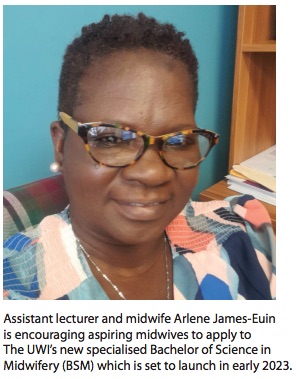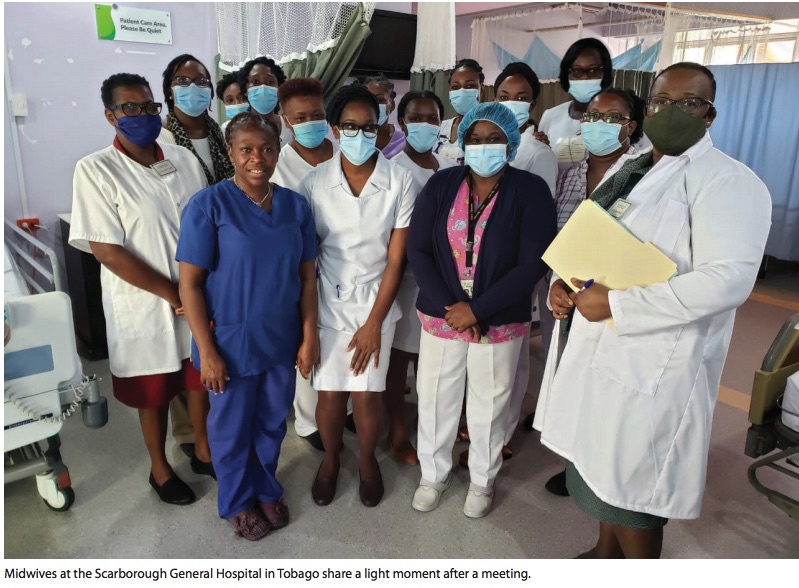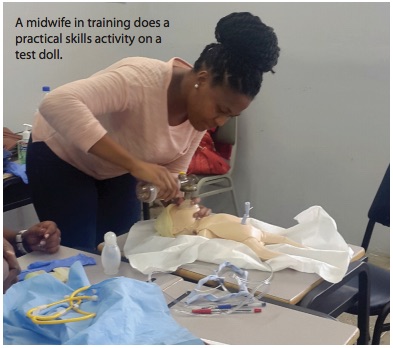UWI School of Nursing to launch new programme to meet demand and boost autonomy of the profession

“Midwifery is something that I hold dear to my heart, and I think it is something very important, especially during a transformative time in a woman’s life,” said Mrs Arlene James-Euin assistant lecturer at The UWI School of Nursing (UWISoN) and midwife.
“The greatest challenge is that people don’t see midwives as being autonomous practitioners, and so we are not able to work within our full scope of practice in Trinidad and Tobago.”
In addition, T&T is currently experiencing a shortage in midwives because of natural attrition and migration.
Recognising the need to fill the gap of qualified midwives in Trinidad and Tobago and develop the profession, UWISoN is set to launch a specialised Bachelor of Science in Midwifery (BSM) in early 2023. The programme was created to enhance the services provided by midwives, and give renewed legitimacy to midwifery as an autonomous practice.
In a recent interview with UWI TODAY, Mrs James-Euin lamented that midwives are viewed as “assistants to obstetricians”, when their services are as essential as any other health care practitioner in the care of the childbearing population. She said the gradual inclusion of midwifery under nursing over time, and the adoption of a medical model of care, led to the field losing some of its autonomy.
James-Euin is a member of the TT Association of Midwives, has been a midwife since 1995, and is also a registered nurse.
A midwife is a person who has successfully completed a midwifery education programme aligned with The International Confederation of Midwives Essential Competencies for Midwifery Practice, and global standards for midwifery education.
Currently, aspiring midwives in T&T with no nursing experience can complete a three/four-year certificate programme offered by the Ministry of Education at their nursing schools located in southern and northern Trinidad. Registered nurses can opt to do an 18-month programme. The College of Science and Technology and Applied Arts of Trinidad and Tobago also offers a BSc in Midwifery for Registered Nurses.

However, students in all programmes must sit and pass the same licensing exam from the Nursing Council of Trinidad and Tobago to be able to practice midwifery.
Mrs James-Euin said the introduction of UWI’s specialised BSM programme means aspiring midwives will no longer need to attend nursing school or be a nurse prior to becoming a midwife.
The programme is geared towards everyone, regardless of their nursing experience, but registered nurses and midwives will have a two-year course of study to finish the BSM, while people without nursing experience will take four years. The programme will have written and practical components.
Though there are currently only three male midwives in T&T, James-Euin said men can become midwives, and she encourages interested men to apply for the new programme. With the new programme, she said midwives are poised to be better empowered and equipped for autonomous practice, including opening their own clinics.
“I applaud the UWI for seeing that offering a BSM is a necessary way of moving midwifery forward. They are not only supporting the national objective in terms of providing much needed competent midwives, but also aiding in developing the field and supporting a group of people who believe in their autonomy and independence,” said Mrs James-Euin.

“What students can expect is to be enrolled in an experience that focuses on women-centred care. But, if you look at midwifery from a deeper level, we don’t only look after women and their unborn babies…we look after the entire family.”
She added, “the whole philosophy behind midwifery is taking care of women pre-conceptually, during their pregnancy, during labour, and then afterwards, in the postnatal period.”
Students in the programme can also expect to learn skills such as communication techniques and leadership styles. Overall, James-Euin wants people to understand the significance of having midwifery being offered at a BSM level.
“The students coming into our programme will realise that they have a special skill they could offer women and their partners in Trinidad and Tobago – midwifery care in and outside of the hospital environment.”
With T&T currently experiencing a shortage in midwives because of natural attrition and migration, James-Euin is calling on people who are passionate about caring for others and midwifery enrol in the programme.
The programme is geared towards everyone, regardless of their nursing experience, but registered nurses and midwives will have a two-year course of study to finish the BSM
Reflecting on her decades of service, James-Euin said the most exciting and fulfilling part of being a midwife is the interaction with women during one of their most vulnerable stages in life and providing care.
“You make a connection with someone, you are there with them, you can help and hopefully empower them to know they can get through pregnancy. “You are even there with them in the early times as they learn to parent their child.”
People interested in the programme can find more information on UWI’s website or contact 662 2002 Ext 3006.